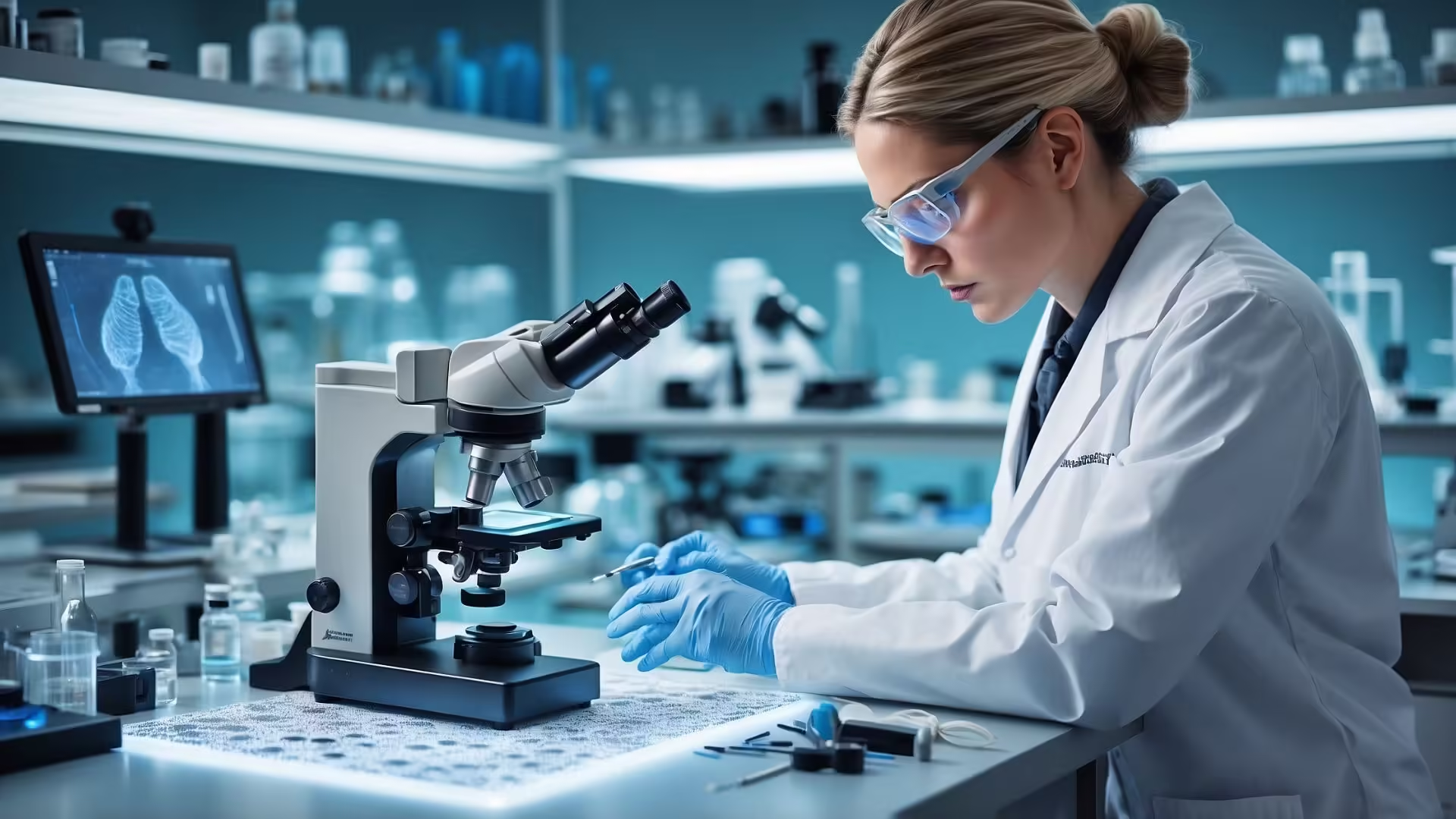- The Gist
- The Path to Becoming a Forensic Scientist
- Education and Degrees in Forensic Science
- Core Skills for Forensic Scientists
- Gaining Field Experience
- Specializations in Forensic Science
- Certifications and Licensure
- The Day-to-Day Work of a Forensic Scientist
- Career Outlook and Job Opportunities
- The Rewarding Path to a Forensic Science Career
- Let’s Talk
- Let’s Learn Vocabulary in Context
The Gist
The path to becoming a forensic scientist is both exciting and challenging, blending science with investigative work to solve crimes. It’s a career that requires a strong background in science, attention to detail, and a commitment to uncovering the truth. From selecting the right degree to gaining field experience, each step builds the foundation for a fulfilling role in criminal justice. That’s just the gist of what this post is about. If you want to dig deeper into the topic, some discussions about it, and learn some key vocabulary from its context, read the post.
The Path to Becoming a Forensic Scientist
Forensic science is a fascinating field that combines science and criminal investigation, providing key insights into solving crimes. Forensic scientists play a vital role in gathering and analyzing evidence, helping law enforcement agencies understand what happened at a crime scene. If you’re intrigued by the idea of using science to make a real difference in the justice system, becoming a forensic scientist might be the right path for you. Let’s explore the education, skills, and experiences needed to succeed in this rewarding career.
Education and Degrees in Forensic Science
The first step on the path to becoming a forensic scientist is obtaining the right education. A bachelor’s degree is typically required, with majors in forensic science, biology, chemistry, or a related field. For those looking to specialize further, pursuing a degree specifically in forensic science can provide targeted knowledge in areas such as DNA analysis, toxicology, and crime scene investigation.
Some universities offer programs that combine criminal justice with forensic science, giving students a broader understanding of the criminal justice system. Forensic scientists often continue their education by pursuing a master’s degree, especially if they aim for specialized roles or leadership positions within the field. Advanced studies allow students to focus on areas like forensic psychology, forensic anthropology, or digital forensics, depending on their interests.
Core Skills for Forensic Scientists
Being a successful forensic scientist requires a specific set of skills that go beyond scientific knowledge. Attention to detail is crucial, as even the smallest piece of evidence can play a critical role in a case. Forensic scientists must be thorough in collecting, analyzing, and documenting evidence to ensure that every detail is accounted for.
Critical thinking and problem-solving are also essential skills. A forensic scientist must interpret data accurately and draw logical conclusions based on the evidence. This often involves sifting through complex information and maintaining an objective perspective, as evidence must be interpreted impartially.
Additionally, strong communication skills are vital. Forensic scientists often work as part of a team with law enforcement officials, attorneys, and other specialists, so they need to communicate their findings clearly. In some cases, forensic scientists may testify in court, explaining complex scientific information in ways that can be easily understood by judges and juries.
Gaining Field Experience
Field experience is a key component of building a successful career in forensic science. Many students gain initial experience through internships or volunteer opportunities with law enforcement agencies or crime labs. These opportunities provide hands-on training, helping aspiring forensic scientists learn how to work with evidence, handle crime scene protocols, and use forensic technology.
On-the-job training is also a common part of starting out in forensic science. New forensic scientists often undergo several months of training under the supervision of experienced professionals, which allows them to apply their academic knowledge in real-world settings. This practical experience is invaluable, as it helps bridge the gap between theory and practice, preparing forensic scientists to handle the challenges of the job.
Specializations in Forensic Science
Forensic science is a broad field with numerous specializations. Some forensic scientists work in laboratories, focusing on tasks like DNA analysis, drug testing, and toxicology. Others may work as crime scene investigators, gathering physical evidence directly from crime scenes and analyzing it to reconstruct the events.
Popular specializations include forensic biology, which focuses on DNA and bodily fluids; forensic chemistry, which involves analyzing substances like drugs and explosives; and digital forensics, which investigates electronic evidence from computers and mobile devices. Each specialization requires a different set of skills and expertise, and selecting a focus can help forensic scientists tailor their education and experience toward a specific career path.
Certifications and Licensure
Although certification isn’t mandatory for all forensic science roles, many forensic scientists pursue certification to enhance their credibility and career prospects. Organizations like the American Board of Criminalistics and the International Association for Identification offer certification programs in various forensic disciplines.
Certification shows that a forensic scientist has met a standard of knowledge and experience in their area of expertise. In some specializations, such as forensic toxicology or forensic psychology, state licensure may be required to practice. Obtaining certification or licensure can increase job opportunities and demonstrate a commitment to professionalism and quality in forensic science.
The Day-to-Day Work of a Forensic Scientist
The daily responsibilities of a forensic scientist vary widely depending on their specialization. Some forensic scientists spend most of their time in laboratories, running tests and analyzing samples. Lab work might involve testing blood samples for drug traces, analyzing fibers, or examining DNA. Other forensic scientists work primarily in the field, collecting and preserving evidence directly from crime scenes.
In both roles, forensic scientists must document their findings thoroughly, as their reports are essential for building cases and may be used in court. Courtroom testimony can also be a part of the job, requiring forensic scientists to explain their methods and findings clearly to people who may not have a scientific background. Forensic scientists need to stay up-to-date with advancements in technology and techniques, as the field constantly evolves.
Career Outlook and Job Opportunities
Forensic science is a growing field, with demand for forensic scientists expected to increase as technology advances and law enforcement agencies rely more on scientific evidence. The U.S. Bureau of Labor Statistics projects steady job growth in forensic science, especially for those with specialized skills in areas like DNA analysis and digital forensics.
Career opportunities for forensic scientists extend beyond traditional crime labs. Some forensic scientists work for government agencies, environmental agencies, or private companies that require forensic expertise. With further education and experience, forensic scientists may also move into roles as forensic consultants, professors, or researchers.
The Rewarding Path to a Forensic Science Career
Becoming a forensic scientist is a challenging yet highly rewarding journey, blending science with the justice system to uncover the truth. From obtaining the right education to building practical experience and developing essential skills, each step on this path brings you closer to a career where you can make a tangible impact. For those who are detail-oriented, analytical, and passionate about solving mysteries, forensic science offers a unique and fulfilling way to use scientific knowledge in service of justice.
Let’s Talk
Let’s dig into what it’s really like to pursue forensic science. The field itself sounds thrilling, doesn’t it? There’s this mix of science, mystery, and justice that makes it feel like you’re part detective, part scientist. But there’s more to it than just analyzing DNA or matching fingerprints, and the day-to-day reality is often less dramatic than what we see on TV.
First off, the education path is serious business. We’re talking years of studying biology, chemistry, maybe even toxicology, depending on what you want to specialize in. And while you’re diving into these subjects, you’re also developing skills like critical thinking, patience, and attention to detail. It’s a bit like being a puzzle solver, where every piece matters. But here’s a question: if you had to choose, would you be more interested in working directly at crime scenes or in a lab, analyzing evidence? Because that choice often shapes the direction your career takes in forensic science.
And let’s not forget about the importance of teamwork. Sure, forensic scientists work solo at times, but much of the job involves collaborating with detectives, attorneys, lab techs, and even other scientists. Communication is key, especially when you’re sharing complex scientific findings with people who might not have a science background. Imagine explaining DNA analysis to a roomful of jurors who are just hoping to understand what you’re saying. That’s a skill in itself—being able to make science make sense.
Then, there’s the courtroom aspect. Not everyone realizes that forensic scientists might be called to testify in court. It’s not just about the science; it’s about presenting the science in a way that supports justice. You could say it’s the most high-stakes presentation there is. So, how would you feel about that part? Standing in court, explaining evidence you analyzed, knowing that it could influence the case’s outcome?
Forensic science is truly a blend of academic rigor and real-world impact. Every piece of evidence, every analysis, plays a role in uncovering the truth, which is ultimately what makes the work so rewarding. Forensic scientists don’t just bring answers to cases; they bring closure to families and justice to victims. It’s a powerful path, one that demands patience, precision, and, yes, a bit of passion for solving mysteries. So, are you up for the challenge? Because the field is calling those who are ready to bring a little bit of science into the world of justice.
Let’s Learn Vocabulary in Context
Let’s dive into some of the key terms that make up the world of forensic science. First up is forensic itself. Forensic relates to scientific methods used to solve crimes. When we say forensic scientist, we’re talking about someone who applies science to uncover the truth about what happened in a crime.
Then we have evidence, which is crucial in this field. Evidence includes anything that can help determine what happened at a crime scene, like fingerprints, DNA samples, or even fibers from clothing. It’s all about piecing together clues.
Crime scene is a term we hear a lot, and it’s simply the location where a crime took place. Forensic scientists either work at the crime scene or examine evidence collected from it.
Analysis is the process of examining evidence to understand it. In forensic science, analysis might involve breaking down substances in a lab, looking closely at hair samples, or comparing DNA.
Specialization means focusing on a particular area within forensic science. A forensic scientist might specialize in DNA, toxicology, or digital forensics, each requiring a unique set of skills and expertise.
Let’s talk about toxicology next. Toxicology is the study of toxins and poisons. In forensic science, toxicologists analyze substances in the body to understand if drugs or poisons played a role in a crime.
Critical thinking is a major skill in forensic science. It’s about analyzing facts objectively and making reasoned judgments. Forensic scientists use critical thinking to interpret evidence and decide what it means.
Documentation is another key term. Documentation involves recording every detail of evidence and findings, which is essential because these records might be used in court.
Testify refers to when forensic scientists speak in court, explaining their findings to the judge and jury. They need to be clear and accurate since their testimony can influence the case outcome.
Lastly, credibility is about being trustworthy. Forensic scientists must be credible so that their findings are respected in court. Certification and experience help build this credibility.
Here’s something to ponder: Which of these terms do you think would be the most challenging to master in a forensic science career? And if you could choose, would you want to specialize in something like toxicology or digital forensics?











0 Comments